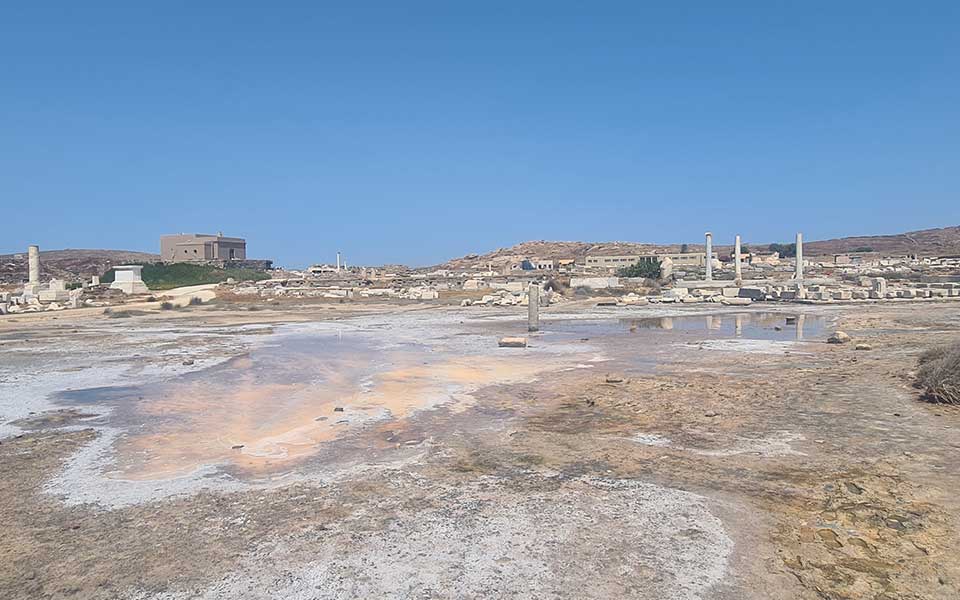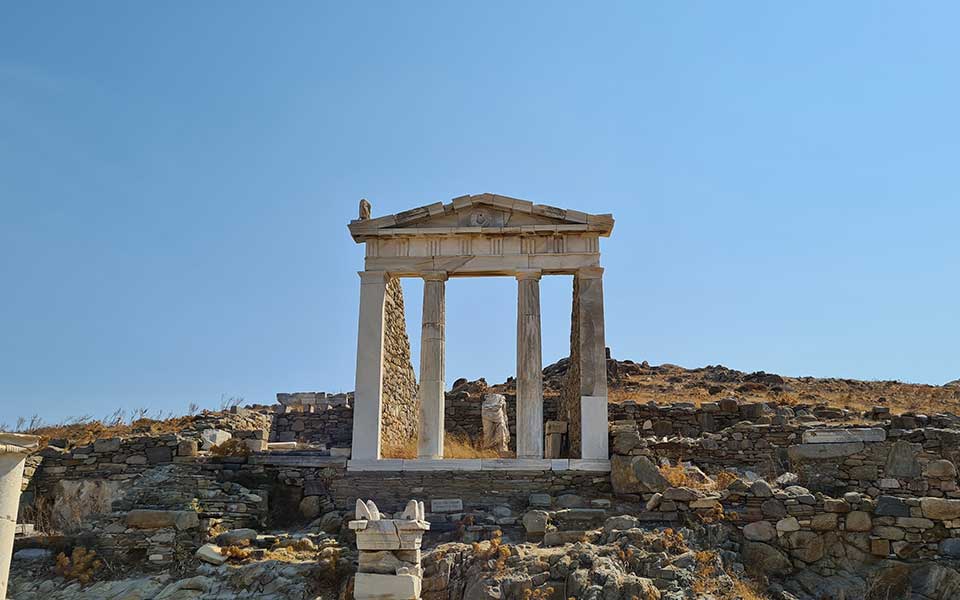How likely is it that future generations will only be able to see the monuments of Delos in photographs? According to a study on the impact of climate change on 244 UNESCO World Heritage Sites in the Mediterranean (published in October 2022), it is highly likely. Based on measurements of multiple environmental impacts, scientists ranked Delos 4th in terms of vulnerability to the effects of climate change.
These discoveries triggered a scientific investigation on Delos’ situation in relation to the climate crisis. Professor Christos Zerefos, the scientific supervisor and overseer of the Academy of Athens’ Research Center for Atmospheric Physics and Climatology, stated that “the program aims to perform a comprehensive assessment of the island to determine the condition of the monuments.”
The first recording instruments have already arrived on the island, and the equipment installation is expected to be completed by September, pending the necessary permits from the archaeological service.

Measurements will soon commence in the air, soil, and surrounding seawater of the island. Additionally, satellite data will be collected to provide a comprehensive overview of Delos’ climatic conditions. An interdisciplinary team of geologists, seismologists, atmospheric scientists, chemists, and other experts will collaborate to analyze the data.
Why is Delos regarded “the most vulnerable beauty of the Aegean,” as Mr. Zerefos describes it, out of hundreds of islands? Delos is exposed to all winds and sea changes due to its location. Furthermore, it is situated at the crossroads of air pollutant transmission between Africa and Europe. Delos is home to major historical monuments, although it has no permanent inhabitants. “In this sense, we can be certain that the recorded data are not influenced by human intervention; the primary culprit is natural phenomena,” says Mr. Zerefos.
Climate change has now escalated into a climate crisis, and what scientists predicted would happen by 2100 is now much closer in time. The coastline of Delos, like many other Greek coastal locations, is severely eroded. “This means that seawater is infiltrating the island’s aquifer, where ancient shops and valuable cultural heritage monuments are located,” explains Mr. Zerefos.

© Shutterstock
Sea Level Rise
Regarding the rise in sea level, Professor Zerefos explains that “it is accelerating more rapidly than we estimated 20 years ago. Certainly, the level has risen in the Aegean and, of course, in Delos. However, determining the extent and progression of erosion and soil disintegration is precisely what we will study.” Additionally, chemical changes in seawater, such as pH variations, will be examined. These measurements will be carried out using relevant instruments placed on the seafloor.
“These changes affect fish, algae, and other marine life, but they also potentially impact the monuments as the water comes into contact with them,” Professor Zerefos points out.
Intense solar radiation, drought, lack of rainfall, and prolonged high temperatures are all factors that undoubtedly affect the monuments, causing significant damage. “The results from the measurements will be compared with estimates based on theoretical models we have developed at the climate center of the Academy of Athens,” concludes Mr. Zerefos. The first findings are expected six months after the equipment is completely installed, in order to provide data from different seasons of the year.
It is worth noting that the study on the impact of climate change on UNESCO’s cultural heritage monuments classifies Delos as “extremely vulnerable.” However, the study also indicates that most Mediterranean monuments are at risk due to climate change and increasingly frequent extreme weather events. In fact, the impact of climate change and increasingly frequent extreme weather phenomena outweighs atmospheric pollution as a risk factor.
“The planned ‘CT scan of Delos’ is an experiment that will provide us with crucial data, which we will then need to assess,” says Professor Christos Zerefos. He explains that similar studies will be conducted in other Southern European countries: “A network has already been established with eight additional countries—Croatia, Cyprus, France, Italy, Malta, Portugal, Slovenia, and Spain—which currently operates informally. This network aims to implement similar programs for other monuments. Cultural heritage monuments are extremely vulnerable to extreme weather events caused by climate change, owing to their antiquity and centuries of exposure. Any intervention must be carried out with the utmost care to ensure the monument’s authenticity is not compromised.”
This article originally published in Greek at kathimerini.gr












